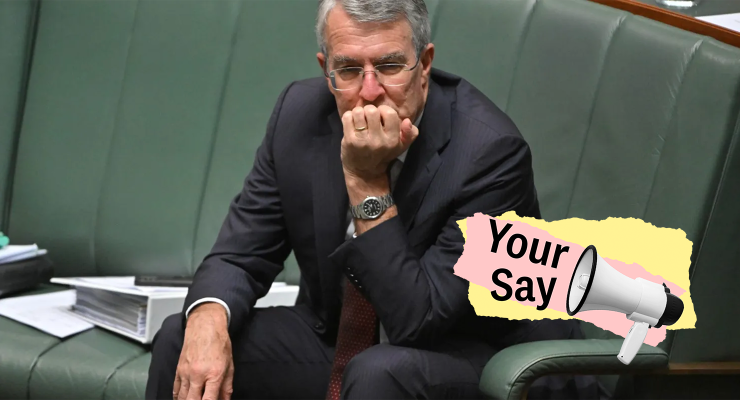
Stephen Dunn writes: The Labor government is gutless in protecting the freedom of information that we need to function as a democracy (“‘Bullshit’: Wilkie slams A-G’s reason for not intervening in whistleblower trials”). With the continued prosecution of Richard Boyle and David McBride, who would blow the whistle in future?
We need legislation to protect whistleblowers, and indeed rewards for exposing wrongdoing. Where would the banking industry be today without whistleblower Jeff Morris? (Although in that case, despite the royal commission, it seems the parties in power have allowed a return to previous business.)
Elizabeth Rider writes: It is essential that our attorney-general — in this case Mark Dreyfus — should support whistleblowers and press freedom. We need a body independent of government to which whistleblowers can turn and which has the responsibility of assessing their allegations and providing them protection if warranted.
Joe Marschall writes: When the A-G argues that the need to provide freedom from political interference to let prosecutors act is paramount in circumstances in which he has specific powers to interfere, he simply demonstrates Labor’s passion for the emoluments of power, the fear of stepping into the space where Opposition Leader Peter Dutton will be critical.
Labor is the shadow-cum-puppet of its populist masters for fear of losing the dollars, perks and other jollies. Sadly, we may as well have voted for the Coalition, because we got it by proxy.
Gerri Hupfeld writes: Whistleblowers should be lauded and thanked for their service to justice, the Australian Tax Office’s practices should be thoroughly examined by courts, and John Howard and his mob who cheated on the Timorese should be held accountable.
Peter Barry writes: Dreyfus has been granted the power to intervene and halt legal cases that are flawed, vengeful and contrary to the public interest. Clearly these powers should be used only in rare instances to stop the invidious legal pursuit of people who have revealed serious wrongdoing.
The cases of Richard Boyle and David McBride surely satisfy these preconditions. Both have bravely done the right thing to unveil deep-seated and embarrassing malfeasance. The sensible thing would be to curtail this farce and improve whistleblower legislation to prevent such occurrences from happening again.
Max Bourke writes: The only thing I would add to the Andrew Wilkie riposte is that Dreyfus is talking “fucking … that’s spelt f.u.c.k.i.n.g … bullshit”!
Christopher Hood writes: McBride is being prosecuted for whistleblowing: that is, for revealing improper conduct — war crimes by Australian forces. Why continue with the prosecution? Because the security state wants a prosecution in which evidence about the truth is restricted, and to which whistleblowing protections might not apply.
Boyle is not being prosecuted for whistleblowing: that is, for having made allegations of inappropriate conduct by the ATO in collecting undisputed debts. He is being prosecuted for improper access to information that wasn’t part of his allegations, and for employee misconduct of other kinds. Why continue with the prosecution? Because Boyle will have to establish that the prosecution really is for his whistleblowing. If it isn’t, his prosecution for other offences should not be blocked.
Boyle’s charges aren’t established to relate in any way to his whistleblowing, and his interlocutory case, currently on appeal, was an argument that he could legitimately troll confidential information not required to do his job if he was looking for something to reveal. He may succeed; as someone with tax records, I hope not.
Both prosecutions should go ahead. McBride should face only public information, and security theatre should not block his whistleblowing defence. If it does, the prosecution should be discontinued.
Boyle should face his prosecution, and his whistleblowing defence should be valid only if his charges are really payback for his (inaccurate) allegations about debt collection. If not, he has and should have no defence.
Kieran Pender’s claims for immunity of McBride and Boyle from legal testing (“Are we a nation that persecutes people who tell the truth?”) should be disregarded.
Bill Westerbeek writes: Dreyfus is not serving the interests of democracy by allowing the prosecutions of Boyle and McBride to go ahead. He is kowtowing to the conservative establishment. Would he not intervene if Australia’s billionaire de facto rulers demanded the prosecutions be dropped? Of course he would.








Journalists don’t bother with nuance because it gets in the way of the black and white analysis and headline.
Yes, the outrageous persecution of whistleblowers (truth tellers) must be stopped at once
To Christopher Hood
No prosecution should ever take place of a journalist merely for trying to get at the truth.
Everyone should have a public interest defence. Not only journalists.
But that doesn’t mean freedom from prosecution: and still less does it mean freedom for actions that aren’t in the public interest. Posting cameras in my bathroom or bedroom? Trolling records of family planning clinics? Accessing my bank account or my tax records? Show a public interest defence, sure – but face prosecution, and if you have no public interest defence face the consequences.
The same goes for access to mining operations, or factory farms…
Dreyfuss a major disappointment.
Whistle-blowers are anathema to knowingly compromised government …. like sunlight on vampires.
And whistle blowers are anathema to privacy. And to the ordinary obligations of employees, or contractors.
Compromised government? Public interest defence.
No public interest defence? Consequences of breaching employee obligations, or contract.
Where can this be sorted out? Only in a court or tribunal: so immunity from prosecution would be a bad thing that would invite weaponised ‘whistleblowing’ regardless of public interest.